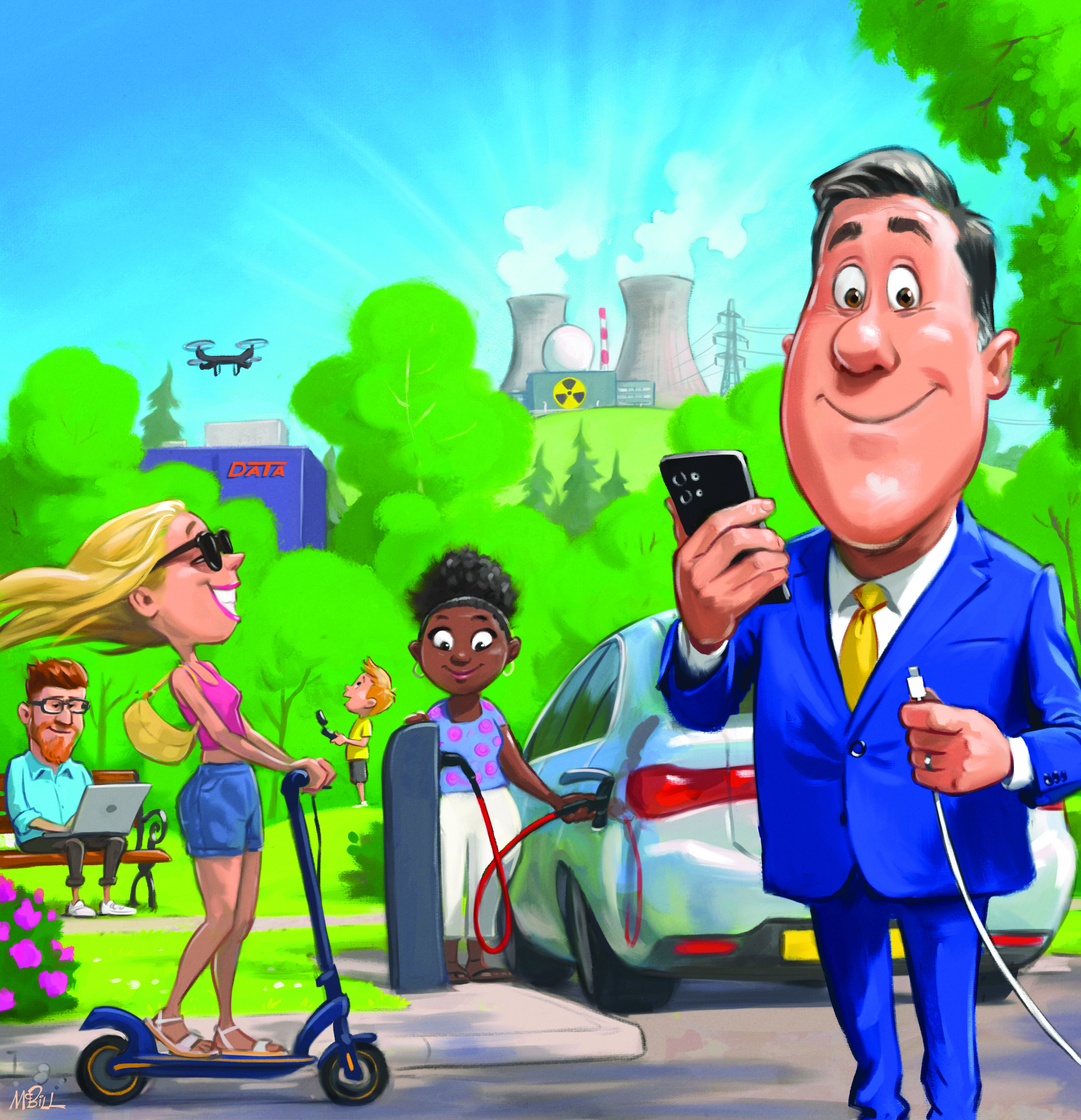Why now looks like a good time to invest in nuclear power
Nuclear power has a terrible PR problem. But it has a vital role to play in energy security, to provide baseload power, and to reduce our carbon emissions. John Stepek looks at the best way to invest.


Get the latest financial news, insights and expert analysis from our award-winning MoneyWeek team, to help you understand what really matters when it comes to your finances.
You are now subscribed
Your newsletter sign-up was successful
Want to add more newsletters?

Twice daily
MoneyWeek
Get the latest financial news, insights and expert analysis from our award-winning MoneyWeek team, to help you understand what really matters when it comes to your finances.

Four times a week
Look After My Bills
Sign up to our free money-saving newsletter, filled with the latest news and expert advice to help you find the best tips and deals for managing your bills. Start saving today!
I was at primary school in 1986, so I wasn’t a big aficionado of current affairs.
I remember two big global news stories from that year. One was Scotland getting kicked out of the first round of the World Cup, after the triumph and heartache involved in the qualifying rounds in 1985.
The other – of much greater significance to everyone outside of Scotland – was the Chernobyl disaster.
MoneyWeek
Subscribe to MoneyWeek today and get your first six magazine issues absolutely FREE

Sign up to Money Morning
Don't miss the latest investment and personal finances news, market analysis, plus money-saving tips with our free twice-daily newsletter
Don't miss the latest investment and personal finances news, market analysis, plus money-saving tips with our free twice-daily newsletter
Nuclear power has an unsurprisingly terrible public relations problem
In the year when unleaded petrol was first introduced to the UK and leaded was still go-to option at your local petrol station, and about a third of the UK’s energy was still produced by burning coal (we’ve cleverly exported our coal burning these days), my main memory is of terrifying news stories about the fallout that was even now gusting across Europe.
To be very clear before I get a flood of angry emails, this is not to say that the fallout didn’t have an impact, particularly on farmers in affected regions. My point is more that the stuff that was already hanging about in the air was levels of magnitude more toxic than what was being blown across the continent.
And this has historically been the problem with nuclear power. The campaign to cut carbon emissions is now embedded in public policy across the globe. If we discovered nuclear energy tomorrow, it would look like a miracle solution – the ability to generate power reliably, and plenty of it, with no carbon emissions.
It would be deemed a renewable energy source and picked as the desired baseload provider to back up more intermittent solar and wind power until we made the necessary battery tech breakthroughs.
Instead, nuclear has been seen as the ultimate in toxic energy production, and investment across the world has been patchy, with many countries keen to phase it out altogether, even while maintaining big coal plants (Germany is the obvious example here).
A poor public image is one reason for this. For example, venture capitalist Josh Wolfe of Lux Capital is leading a mildly amusing campaign to rebrand nuclear power as “elemental energy”.
But while I can see the appeal of blaming hectoring from the greens (and there has been plenty of that) for the lack of uptake, I suspect politics and economics have in fact played a larger role. Power stations are costly to build and no one wants one in their back garden.
As with any collective project whose benefits are long term and whose costs (both financial and political) are mostly upfront, you need a very strong motivation to get behind it and build.
Throw in the vested interests of other energy industries and I don’t think you can lay all the blame at the door of environmentalism, though they’ve served as a useful excuse for sure.
(By the way, if you have a greater insight into the history of nuclear power, I’d be very interested to hear it - ping an email to editor@moneyweek.com with “nuclear power” in the subject line).
Anyway, that’s all a long way round of making the point that we really should be very keen on nuclear power if we want to keep the lights on while simultaneously getting somewhere close to “Net Zero”.
The good news is that there are signs of this now happening, even if it’s taken an energy crisis to really drive home the urgency.
Why now looks a good time to invest in nuclear power
Dylan Grice of Calderwood Capital covered the “buy” case for nuclear in the pages of MoneyWeek as long ago as December 2019. If you’re looking for a good backgrounder, check it out here.
The easiest way to get exposure to the nuclear industry is through investing in nuclear fuel – uranium. And uranium has taken off strongly in the last few years.
What’s interesting now from an investment point of view, though, is that uranium-related stocks have sold off in line with the rest of the commodities sector.
Now, while my gut is still longer-term bullish on commodities, I can see the reasoning behind the recent sell-off. You’ve had demand pulled forward, then pushed back out again. You have a wobbly Chinese economy (which is massive for commodities). And you have an environment which is definitely recession-y, even if you don’t want to use that exact description. None of that is promising for raw material demand.
However, it’s much harder to argue that the bull case for uranium has deteriorated, even in the short term. The collapse in relations with Russia is pretty significant, given that a lot of nuclear fuel comes from there. The energy crisis is also pretty significant, given that it puts pressure on politicians to find solutions, and nuclear power increasingly looks appealing.
The Japanese government wants to have more nuclear plants operational again for winter, while even the greens in Germany are looking at extending the lifespan of their reactors.
In other words, if anything, the bull case has only strengthened in the short term. And with the longer-term drive towards cutting carbon emissions without having to destroy our standard of living, it’s hard to see what the alternatives are.
It’s not difficult for investors to get exposure to the uranium price. My colleague Dominic has written about it several times in the past. You can look at his suggestions here.
Get the latest financial news, insights and expert analysis from our award-winning MoneyWeek team, to help you understand what really matters when it comes to your finances.

-
 Should you buy an active ETF?
Should you buy an active ETF?ETFs are often mischaracterised as passive products, but they can be a convenient way to add active management to your portfolio
-
 Power up your pension before 5 April – easy ways to save before the tax year end
Power up your pension before 5 April – easy ways to save before the tax year endWith the end of the tax year looming, pension savers currently have a window to review and maximise what’s going into their retirement funds – we look at how
-
 Investors should cheer the coming nuclear summer
Investors should cheer the coming nuclear summerThe US and UK have agreed a groundbreaking deal on nuclear power, and the sector is seeing a surge in interest from around the world. Here's how you can profit
-
 Halifax: House price slump continues as prices slide for the sixth consecutive month
Halifax: House price slump continues as prices slide for the sixth consecutive monthUK house prices fell again in September as buyers returned, but the slowdown was not as fast as anticipated, latest Halifax data shows. Where are house prices falling the most?
-
 Rents hit a record high - but is the opportunity for buy-to-let investors still strong?
Rents hit a record high - but is the opportunity for buy-to-let investors still strong?UK rent prices have hit a record high with the average hitting over £1,200 a month says Rightmove. Are there still opportunities in buy-to-let?
-
 Pension savers turn to gold investments
Pension savers turn to gold investmentsInvestors are racing to buy gold to protect their pensions from a stock market correction and high inflation, experts say
-
 Where to find the best returns from student accommodation
Where to find the best returns from student accommodationStudent accommodation can be a lucrative investment if you know where to look.
-
 The world’s best bargain stocks
The world’s best bargain stocksSearching for bargain stocks with Alec Cutler of the Orbis Global Balanced Fund, who tells Andrew Van Sickle which sectors are being overlooked.
-
 Revealed: the cheapest cities to own a home in Britain
Revealed: the cheapest cities to own a home in BritainNew research reveals the cheapest cities to own a home, taking account of mortgage payments, utility bills and council tax
-
 UK recession: How to protect your portfolio
UK recession: How to protect your portfolioAs the UK recession is confirmed, we look at ways to protect your wealth.